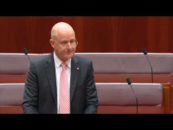Undeterred by their utter failure to predict the increase in the size of the crossbench at the election, a number of political experts are now telling us that this Senate will be easier for the government to deal with than the last one.
The basis for this belief is if you ask someone from the Coalition, that’s what they will tell you. To say anything else would be to admit the double dissolution election was a monumental stuff-up. For admissions like that, we will have to wait for their memoirs.
I think it is more likely that when it comes to dealing with the crossbench this time around, the government will look back on the last term as the good old days.
There is a simple new equation: where they previously needed six out of eight of us to pass legislation opposed by Labor and the Greens, they now need nine from 11.
Glenn Lazarus is gone, it’s true, and those of us who tried to deal with him can attest that the Brick with Eyes was not just his nickname but a description of his negotiation style. But so too are the DLP’s John Madigan, PUP’s Dio Wang and motoring enthusiast Ricky Muir – all of whom negotiated with the government in good faith. And Jacqui Lambie, who was equally problematic for the government, has been re-elected with a six-year term.
Same old, same old
To believe that the government will pass more legislation, we must then believe that those who have replaced them on the crossbenches will be more accommodating. There is no good reason to believe this.
For starters, the pundits constantly ignore the fact that Nick Xenophon rarely supports the government. Xenophon is seeking to create his own mythology by claiming to be a centrist. But if you check the records, you’ll find that he votes with the Greens two-thirds of the time. If he ever decided to change his party name to the Big Spending Protectionists Party, he would not need to adjust his voting pattern.
Then there is One Nation, a party born of protest that will rarely see any bills relating to its core beliefs about restricting immigration and foreign investment.
The government will have an even tougher time if the senators in the Xenophon team or One Nation vote independently rather than as a bloc. As Clive Palmer discovered, keeping a party together based on a personality rather than principles is no easy feat.
There are also those old barnacles on the crossbench like myself for whom there can be no honeymoon period. While I get on well personally with most government senators, just last month the government reneged on a written deal with me to stick to John Howard’s list of banned firearms rather than extend the ban to a firearm that is already widely available.
I will advise my fellow crossbenchers of the names of the ministers who can’t keep their word, even when they write it down – and how Cabinet endorses such behaviour.
So far, all of the attention is on the make-up of the crossbench. But I have seen no indication so far that the government has evaluated its own shortcomings and learned how to negotiate. Some of them began to get the hang of it last time, but their efforts were uncoordinated and haphazard. Watching ministers repeat the mistakes of their colleagues was frustrating.
Pundits wrong
All of which leads me to conclude that the pundits are wrong again. I give the government six months – maybe a bit more – before it realises that very little is going to get through the Senate via the crossbench, and it stops wasting its energy on us altogether.
The only legislation the government would then pursue will be supported by Labor. Labor may even take a conciliatory approach on some issues, because it doesn’t want to be seen as obstructionist and sees an opportunity to make Bill Shorten look like a prime minister-in-waiting.
How some of the crossbench senators might cope with the attention deficit remains to be seen, but it has the potential to be good political theatre.
Unfortunately, it won’t be so good for Australia. Don’t expect to see much progress on repairing the budget, controlling spending or reducing taxes. But then, on these matters, not many of the pundits seem to care.
David Leyonhjelm is a senator for the Liberal Democrats









